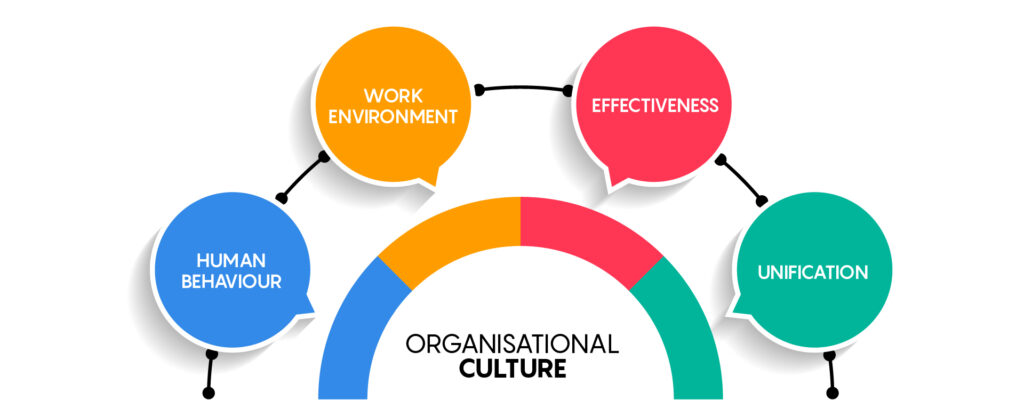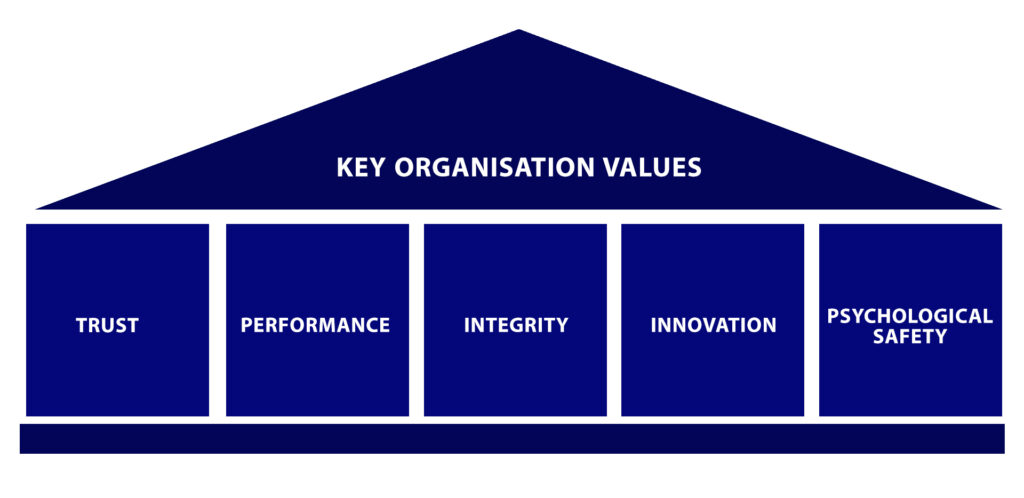When it comes to an organisation’s culture there is no one-size-fits-all as the concept and definition may vary greatly from industry to industry. The only common factor for organisational culture across every industry is the value – the value of a safe and encouraging work environment that promotes growth. Think of culture as the social side of a company and it is extremely important because companies – no matter the industry – are run by humans, and humans are highly social creatures. It’s a simple equation really. A good work environment produces good work.
What Is Organisational Culture?
If you are looking for a hard-set definition then organisational culture (OC) can be defined as a shared set of values or norms that exist within a company which come together to try and form a unified workplace. This definition is putting it very broadly because the concept varies between every industry and is unique to every company – like a fingerprint.
The culture manifests itself in various forms including leadership styles, communication methods, management techniques and corporate celebrations that it becomes a very diverse thing. Given that it makes up so many elements and that it can vary so vastly, it is also often a challenge to maintain culture consistently in the long term.
It does, however, have a few common elements that form the basis of culture:
Human behaviour
This element is a predictive one. It operates off the assumptions and knowledge we have on human behaviour. Using the countless theories to predict how people will act and respond to certain methods helps plan out a strategy.
The work environment
Based on what kind of environment and workflow would be best for maximum productivity while still being enjoyable for employees to operate in.
Effectiveness
There should be a structure in place that helps maximise the effectiveness of the culture. The structure provides stability and that will increase the efficiency of the work.
Unification
Every organisational culture model seeks to unify all those under its employ, under a common mindset and approach to the work so that the combined efforts might result in a common goal being accomplished.

‘‘
The internal atmosphere that a company maintains will ultimately determine the identity it builds as a brand and consequently the efficiency of its employees.
The Significance Of OC
Every aspect of the business has some elements of organisational culture playing a role in its function. The fact that it is so thoroughly integrated into a business tells you how important a factor it is. Beyond being a model for efficiency, it serves another purpose. It is an identity, a reputation if you will.
The better the organisational culture in a company, the more talented employees will be willing to work. People are more inclined to work at a place with a stellar organisational culture, as opposed to one with a poor organisational culture and high pay. It acts as a beacon of better opportunities for all those wayward, talented individuals.
The Role Of HR In The Culture
HR is the cultural liaison. HR managers work with the top brass to bring about a good culture in the workplace. They act as two-way channels, enabling smooth communication and feedback. It is the HR’s duty to ensure that the organisational culture is helping employees meet the business’s goals efficiently while being in the employees’ best interest as well.
How To Build A sustainable Culture
Recognise the effort
Giving credit where credit is due – a concept that goes a long way in OC. When the management takes the time and the effort to recognise the efforts put in by employees, it works wonders for boosting morale. The more you appreciate your employees, the better the culture in terms of employee engagement, retention and productivity.
This does not mean it should be a once-in-a-blue-moon situation. For example, some organisations have this concept of ‘employee of the month’ where the most effort put forth results in your picture going up on a wall. The effort is recognised on a monthly (regular) basis.
Enable the voice of employees
Speaking of recognising employees, there needs to be equal amounts of recognition for their voices as well. Creating a cultural system that encourages feedback and suggestions is vital for growth. There are a number of ways in which you could collect that information. Surveys are one such method and can be applied on a large scale.
The buck does not stop at collecting the information. The responsibility of seeing these changes through falls to the management. A good sign that you are on the right track is that employees have no hesitation when giving you feedback.
Assign leaders to advocate
At every stage of the company hierarchy, there will always be those small pockets of employees who have distinct leadership qualities and take charge. They are usually the first to speak up. Make use of their boldness and assign them as leaders for that level. Make them the voice of employees as many might find it intimidating to speak to the management directly. Making a fellow colleague the point of contact greatly improves the process of to-and-fro.
Focus on learning and development.
The best work environments are those which allow for continuous growth is learning and skill development. Companies that invest in initiatives like training initiatives, coaching and allowing employees to grow laterally by trying their hand in new areas, will see a massive uptake in productivity and output quality. Consider it an investment in your future, like sending your kids to school so that tomorrow they will have more knowledge and skill than today.
Maintain better hiring practices
When it comes to hiring the right employees, it goes beyond them having excellent skills for the job. It is the responsibility of the management and HR to ensure that the persons being onboarded are aligned with the company’s culture.
This can mostly be identified in the interview and initial intake stage. Ask subtle questions about previous experiences. Look at scenarios in the past where they had to work cohesively in a team, or efficiently as an individual. The aim is to ensure that they are capable of being integrated into the existing work culture and if they can add value to it.
Personalise the cultural experience for employees
In the modern workplace, employees are just another consumer of your brand. They seek it out based on the organisational culture that you offer them, similar to a customer with a product. It is not enough to just have a unique culture. You need to provide a unique experience of that culture as well. Take the information you have from the aforementioned surveys and interviews and learn what you can about your employees’ needs.
It is not just about what they bring to the table, it is also about what your company can offer them if they can work for you. It should be personalised in such a way that the employees feel valued and understood.

Key Values For An Ideal Organisational Culture
Trust
It is a vital part of an organisation because colleagues need to be able to rely on and trust each other, especially when the work gets challenging. The same goes for the management-employee dynamic. For example, you definitely want to avoid micromanaging your employees as it breeds mistrust and overall morale takes a hit.
Performance
At the end of the day, the goal of doing all this is to increase productivity as well. It is a business after all and the bottom line also matters. Management has a responsibility to ensure that the cultural standards that have been put in place are being maintained while still being effective. They were thought of for a reason – to increase efficiency. If something does not work, change it until it does. This means that the organisational culture also needs to be flexible and adaptable to new and rapidly changing environments.
Integrity
There should be no doubt as to the intention of a company. Complete transparency when it comes to the intentions of a workplace should be there. Employees need to be able to trust the process as much as they trust each other.
Innovation
If an organisation wants to stay ahead of the competition, even in terms of the culture, it needs to innovate. Make use of all the various techniques feel free to experiment and try radical ideas of what a workplace means. Focus on what could be rather than what should be.
For example, Google’s Headquarters in the US has an astounding workplace culture that centres around a relaxation, fun, vibrant and engaging work environment. It is basically like living in Willy Wonka’s factory for techies. It is such an informal setting, yet they handle one of the biggest brands in the world.
‘‘
All of these values and factors converge to meet the same need. A need for the mental and physical well-being of the employees.
Psychological Safety
It is important that employees feel safe where they work. Yes, every company will have highly stressful scenarios which are inevitable at some point or another. Employees should feel as though those situations can be faced with confidence knowing that the management is giving them the support they need.
Emotional and mental health are very crucial to maintaining a productive work environment and an organisation that prioritises those factors will see significant changes. It comes down to making everyone feel at home, even at work. There should be a sense of comfort and comradery that emphasises unity amongst everyone.
Read our article on ‘team building’ to learn more about how you can bring people together to achieve a common goal.




